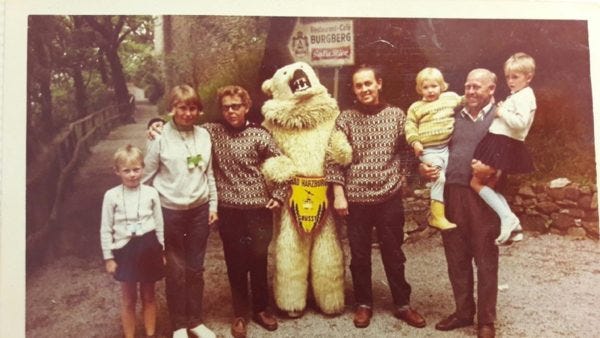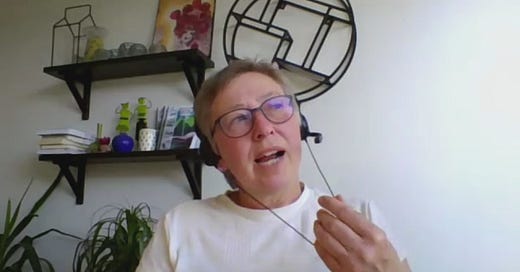This is an extract from a new long-form podcast format I'm trying, with co-host Andy, who is a person with a Parkinson’s diagnosis and a valued member of our Online Community, supporting me with his excellent communication skills.
This way, we can reach more people than I can alone. this ping-pong format really suits me. Here is the long video
Here we talk about breaking the old beliefs of conditions like Parkinson’s, like “there is nothing you can do” and “you can only get worse”. Also see the annotated photographic illustration at the bottom of the post.
Please get my book for a family member that need to know there is another way of looking at chronic illness.
Transcript
Andy: Next question, Lilian. How do you know that it is stress that causes Parkinson's?
Lilian: You can say, I don't go in that direction. I instead think stress is the major component here. So let's forget the diagnosis, forget toxins, genes or not, genetic conditions, and work with the stress and see how far we can come, and maybe we come to 90% reduction, maybe we come to only 1%, or maybe some even come to zero. That is a lot better than just following the stream of “nothing is possible and you can do nothing”.
You can ask yourself the questions, especially the guys who are not on dopamine. Do you have seconds, minutes, or hours without symptoms? Think back on the last summer holiday at the end of the vacation, where you are settled down and hopefully among friendly people. How big were your symptoms there? That might be a good indicator of how far you can reach pretty easily.
So, before diagnosis, did you have minutes or hours without symptoms?
Andy: I did definitely had minutes or hours without symptoms. My symptoms were a lot lower, but I definitely had time. I mean, my symptoms even today they vary. I sometimes have quite intense tremors, for example, and then I can just do some slow, deep breathing and I can calm my tremor down completely, so I have no tremor. This is when I'm not on medication.
So it definitely proves that there's a link between how calm my body is and how strong my symptoms are.
Lilian: So you can go from an eight, a nine, a 10, and down to zero (on a symptom scale)?
Andy: I can at night, especially because I don't take any medication at night time. My left hand will wake up, and my left hand will start to tremor quite strongly. I can breathe my way to calm down the tremor. If I just slow down my breathing, think about things that aren't negative or stressful, I can calm down my body and calm down my symptoms.
So there's this very, very clear link between the two.
Lilian: And that in itself is a big, can we call it a revolution?
Andy: It's a superpower. I feel powerful that I can do that. It is wonderful.
Lilian: And you can say in the bigger picture, everything I do is to turn things around.
Andy: Absolutely. It's a work in progress. I'm working on it.
OK, next question. What is the significance of old beliefs in recovery?
Lilian: Of course, it depends on what beliefs you have, but we are brought up with a belief that there's chronic illness and chronic illness you cannot cure. In reality, when you call an illness chronic it's only mean that it takes at least three to six months to recover from it or more.
And if you go into that, the day that the whole world realize it, I would guess that you could stop symptoms from becoming worse if a person went directly to the realization, “oh, I've got stress symptoms” and got help from spouses, family, friends, Family doctor, neurologist and all other knew it.
So you can say that's another, this part of, we are in a revolution here, a health revolution. It is that it unfortunately takes some years to go from this old belief, you can do nothing, it will be forever, it will be worse, and to the new belief there are so many things you can do.
Right now, it's emergent. When I started eight years ago, I could see and hear no open opinions from, for example, doctors and neurologists. Now people actually report back that their neurologists start talking about fight, flight and freeze, our instincts. People come back and tell that they have been ordered to go to a gym and that some doctors are becoming informed of this big stress link.
So, in eight years, we have got some cracks in the old belief. There's something Gary Sharpe has taught me that there's something called common knowledge.
That's what we believe in the big society. Then there's private knowledge. It's when you, for example, share the story that you can stop your tremor in a few moments by doing relaxation techniques. So a lot of the people with Parkinson's have the private knowledge that they can relax themselves and that impacts their symptoms. But often family, friends, neighbors, and doctors haven't felt it themselves, so they only know what is written.
Recording this, we are breaking the old beliefs, and more and more private opinions are validated so people can feel seen and heard and start breaking it out to the spouse they trust, friends they trust. Then slowly, the theories say when you reach about 30% that got this new knowledge, “yes, Parkinson's symptoms are very dependent on the stress level”, then it will crack open to the rest of the population very fast.
So it will be in the next 10 years, we will witness this. So the cracks are there. Few neurologists are coming forward. I've heard it mentioned in speeches here and there, in a few sentences that something is going on, and they talk about “the stress that breaks the camel's back,” and is the one that starts this all.
But here in Hope Shortcut, we dig deeper all the time, figuring out what layer of stress is behind. If you take in childhood trauma and job stress and what have you from a whole life, things start to make sense.
Andy: Sometimes a trauma that's quite profound can be something that other people would think is quite insignificant. Something that's really stayed with you for years can be a very small, tiny thing that someone else might say, well, that's not stressful. But if it was stressful to you, then it's a trauma, it's a stressor.
Lilian: As I use this example, if you see a little child playing with a puppy, it seems sweet and nice, but you don't know if that little child actually had some seconds or minutes in fear because the dog is as big as them. So it's like us meeting a polar bear. Who knows? Time will tell how it affects that child.















Share this post